Edie Melson's Blog, page 342
May 24, 2016
Stories Have Souls That Breathe Immortality
by DiAnn Mills @DiAnnMills
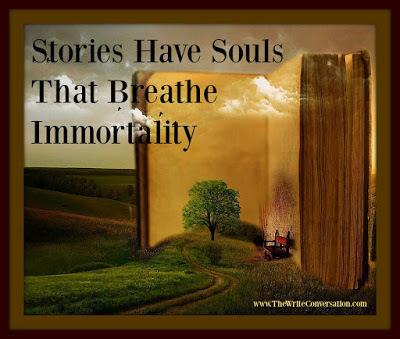 An unforgettable story steps beyond “Once upon a time” to a kingdom that captures the heart of a reader forever. Not every story has that golden world, and not every reader experiences the same soul-grabbing story. What lingers as a memorable novel for me may not give you an exceptional read. But what we will agree upon is the story touched us, spoke to us, and we were passionately involved in the lives of the characters and their quest. The magic kingdom is filled with rare, distinct, haunting, and extraordinary characters who accompany us to our sweet spot of remembrance. Readers and writers dream the character is real and imagine themselves joining the journey. Some readers become the hero or heroine, much like children don super-hero costumes and develop mannerisms of their favorite character.How does a writer accomplish this amazing feat? Is there a magic wand to wave over our keyboard? There’s no fairy dust in writing. It’s all hard work.
An unforgettable story steps beyond “Once upon a time” to a kingdom that captures the heart of a reader forever. Not every story has that golden world, and not every reader experiences the same soul-grabbing story. What lingers as a memorable novel for me may not give you an exceptional read. But what we will agree upon is the story touched us, spoke to us, and we were passionately involved in the lives of the characters and their quest. The magic kingdom is filled with rare, distinct, haunting, and extraordinary characters who accompany us to our sweet spot of remembrance. Readers and writers dream the character is real and imagine themselves joining the journey. Some readers become the hero or heroine, much like children don super-hero costumes and develop mannerisms of their favorite character.How does a writer accomplish this amazing feat? Is there a magic wand to wave over our keyboard? There’s no fairy dust in writing. It’s all hard work.
We labor to create characters who are:Multi-dimensional.Full of life.Possess authentic flaws.Solid victories.Believable strengths.
 We immerse them into difficult settings.We immerse them into a setting that is determined to see the character fail by tossing rocks, swords, bullets, bombs, lies, and the hero’s worst fears into their paths. (Think Indiana Jones and his aversion to snakes.) We offer the character a way out of his predicament, but the hero refuses. When knocked down, he gets back up. When bleeding he smacks on a Band-Aid and keeps moving. When he’s defeated in battle, he understands the war is not over.
We immerse them into difficult settings.We immerse them into a setting that is determined to see the character fail by tossing rocks, swords, bullets, bombs, lies, and the hero’s worst fears into their paths. (Think Indiana Jones and his aversion to snakes.) We offer the character a way out of his predicament, but the hero refuses. When knocked down, he gets back up. When bleeding he smacks on a Band-Aid and keeps moving. When he’s defeated in battle, he understands the war is not over.
 They inspire us to be better people.The characters are unique.The characters are not afraid to love or give.They are secure in who they are.They are confident in their abilities and willing to learn new skills.They accept a higher deity called God is in charge of the universe.They make mistakes and learn from them.Their appeal is shown in their response to life’s challenges.They inspire us to be better people.They offer hope in a world that threatens our peace of mind.
They inspire us to be better people.The characters are unique.The characters are not afraid to love or give.They are secure in who they are.They are confident in their abilities and willing to learn new skills.They accept a higher deity called God is in charge of the universe.They make mistakes and learn from them.Their appeal is shown in their response to life’s challenges.They inspire us to be better people.They offer hope in a world that threatens our peace of mind.
Is a writer always successful in establishing the immortal character? Unfortunately, not. But we never give up because it’s in our DNA for each book to be better written than the previous one. We writers are committed to our craft, so that our stories and their characters will live forever in a reader’s mind and heart.
How do your characters show heart?
TWEETABLE
Stories have souls that breathe immortality - @DiAnnMills on @EdieMelson (Click to Tweet)
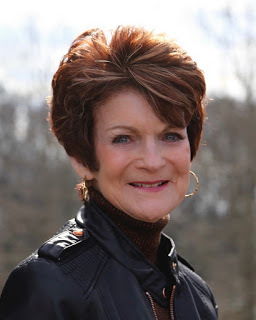 DiAnn Mills is a bestselling author who believes her readers should expect an adventure. She combines unforgettable characters with unpredictable plots to create action-packed, suspense-filled novels.
DiAnn Mills is a bestselling author who believes her readers should expect an adventure. She combines unforgettable characters with unpredictable plots to create action-packed, suspense-filled novels.
Her titles have appeared on the CBA and ECPA bestseller lists; won two Christy Awards; and been finalists for the RITA, Daphne Du Maurier, Inspirational Readers’ Choice, and Carol award contests. Library Journal presented her with a Best Books 2014: Genre Fiction award in the Christian Fiction category for Firewall.
DiAnn is a founding board member of the American Christian Fiction Writers; a member of Advanced Writers and Speakers Association; International Thriller Writers, and the Faith, Hope, and Love chapter of Romance Writers of America. She is co-director of The Author Roadmap with social media specialist Edie Melson where she continues her passion of helping other writers be successful. She speaks to various groups and teaches writing workshops around the country.
DiAnn has been termed a coffee snob and roasts her own coffee beans. She’s an avid reader, loves to cook, and believes her grandchildren are the smartest kids in the universe. She and her husband live in sunny Houston, Texas.
DiAnn is very active online and would love to connect with readers on any of the social media platforms listed at www.diannmills.com.
 An unforgettable story steps beyond “Once upon a time” to a kingdom that captures the heart of a reader forever. Not every story has that golden world, and not every reader experiences the same soul-grabbing story. What lingers as a memorable novel for me may not give you an exceptional read. But what we will agree upon is the story touched us, spoke to us, and we were passionately involved in the lives of the characters and their quest. The magic kingdom is filled with rare, distinct, haunting, and extraordinary characters who accompany us to our sweet spot of remembrance. Readers and writers dream the character is real and imagine themselves joining the journey. Some readers become the hero or heroine, much like children don super-hero costumes and develop mannerisms of their favorite character.How does a writer accomplish this amazing feat? Is there a magic wand to wave over our keyboard? There’s no fairy dust in writing. It’s all hard work.
An unforgettable story steps beyond “Once upon a time” to a kingdom that captures the heart of a reader forever. Not every story has that golden world, and not every reader experiences the same soul-grabbing story. What lingers as a memorable novel for me may not give you an exceptional read. But what we will agree upon is the story touched us, spoke to us, and we were passionately involved in the lives of the characters and their quest. The magic kingdom is filled with rare, distinct, haunting, and extraordinary characters who accompany us to our sweet spot of remembrance. Readers and writers dream the character is real and imagine themselves joining the journey. Some readers become the hero or heroine, much like children don super-hero costumes and develop mannerisms of their favorite character.How does a writer accomplish this amazing feat? Is there a magic wand to wave over our keyboard? There’s no fairy dust in writing. It’s all hard work.We labor to create characters who are:Multi-dimensional.Full of life.Possess authentic flaws.Solid victories.Believable strengths.
 We immerse them into difficult settings.We immerse them into a setting that is determined to see the character fail by tossing rocks, swords, bullets, bombs, lies, and the hero’s worst fears into their paths. (Think Indiana Jones and his aversion to snakes.) We offer the character a way out of his predicament, but the hero refuses. When knocked down, he gets back up. When bleeding he smacks on a Band-Aid and keeps moving. When he’s defeated in battle, he understands the war is not over.
We immerse them into difficult settings.We immerse them into a setting that is determined to see the character fail by tossing rocks, swords, bullets, bombs, lies, and the hero’s worst fears into their paths. (Think Indiana Jones and his aversion to snakes.) We offer the character a way out of his predicament, but the hero refuses. When knocked down, he gets back up. When bleeding he smacks on a Band-Aid and keeps moving. When he’s defeated in battle, he understands the war is not over.
 They inspire us to be better people.The characters are unique.The characters are not afraid to love or give.They are secure in who they are.They are confident in their abilities and willing to learn new skills.They accept a higher deity called God is in charge of the universe.They make mistakes and learn from them.Their appeal is shown in their response to life’s challenges.They inspire us to be better people.They offer hope in a world that threatens our peace of mind.
They inspire us to be better people.The characters are unique.The characters are not afraid to love or give.They are secure in who they are.They are confident in their abilities and willing to learn new skills.They accept a higher deity called God is in charge of the universe.They make mistakes and learn from them.Their appeal is shown in their response to life’s challenges.They inspire us to be better people.They offer hope in a world that threatens our peace of mind.Is a writer always successful in establishing the immortal character? Unfortunately, not. But we never give up because it’s in our DNA for each book to be better written than the previous one. We writers are committed to our craft, so that our stories and their characters will live forever in a reader’s mind and heart.
How do your characters show heart?
TWEETABLE
Stories have souls that breathe immortality - @DiAnnMills on @EdieMelson (Click to Tweet)
 DiAnn Mills is a bestselling author who believes her readers should expect an adventure. She combines unforgettable characters with unpredictable plots to create action-packed, suspense-filled novels.
DiAnn Mills is a bestselling author who believes her readers should expect an adventure. She combines unforgettable characters with unpredictable plots to create action-packed, suspense-filled novels.
Her titles have appeared on the CBA and ECPA bestseller lists; won two Christy Awards; and been finalists for the RITA, Daphne Du Maurier, Inspirational Readers’ Choice, and Carol award contests. Library Journal presented her with a Best Books 2014: Genre Fiction award in the Christian Fiction category for Firewall.
DiAnn is a founding board member of the American Christian Fiction Writers; a member of Advanced Writers and Speakers Association; International Thriller Writers, and the Faith, Hope, and Love chapter of Romance Writers of America. She is co-director of The Author Roadmap with social media specialist Edie Melson where she continues her passion of helping other writers be successful. She speaks to various groups and teaches writing workshops around the country.
DiAnn has been termed a coffee snob and roasts her own coffee beans. She’s an avid reader, loves to cook, and believes her grandchildren are the smartest kids in the universe. She and her husband live in sunny Houston, Texas.
DiAnn is very active online and would love to connect with readers on any of the social media platforms listed at www.diannmills.com.
Published on May 24, 2016 21:18
7 Tips to Help You Focus Your Writer’s Eye
by Edie Melson @EdieMelson
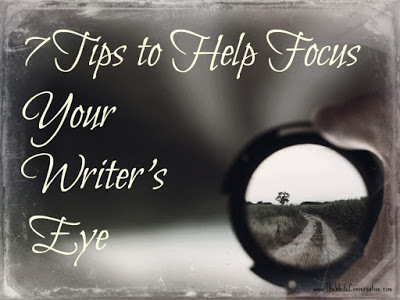 7 tips to help focus your writer's eye.By and large writers are an observant lot. Things others might brush over or miss entirely stay with us, sparking ideas that blossom and grow. An overheard conversation can lead us to the plot of entire book.
7 tips to help focus your writer's eye.By and large writers are an observant lot. Things others might brush over or miss entirely stay with us, sparking ideas that blossom and grow. An overheard conversation can lead us to the plot of entire book.
But like any skill that comes naturally, there's still room for improvement.
I call it focusing the writer’s eye. Today I want to give you seven tips to help you focus your writer's eye.
1. Stop hearing, and take time to listen. The world around us is filled with words. So much so that it becomes a kind of white noise. As writers we need to be able to pick out the bits and pieces that resonate with the souls of our audience.
 Search out the music.2. Search out the music. The spoken word can have a lyrical quality. As writers it’s our job to capture that music on a page. Develop an ear for the cadence in words and sentences.
Search out the music.2. Search out the music. The spoken word can have a lyrical quality. As writers it’s our job to capture that music on a page. Develop an ear for the cadence in words and sentences.
3. Take what’s being said—not what’s meant—and follow it an unexpected end. For example, I overheard someone talk about another person’s downfail. No that’s not a typo, I meant to write DOWNFAIL. From the context, I know he meant to use the word, DOWNFALL. But that lead me to a cool devotion on the difference between the two concepts.
4. Paint a picture . . . with words. Look at something that intrigues you, or inspires you, and recreate it in words. Try to boil it down to the essence in a way that others can experience what you did.
 Expand your horizons.5. Expand your horizons.I’ve heard it said that the English language is limiting because it’s not a large language. There just aren’t as many words as in other languages. That may be true, but while the average adult is said to have a vocabulary of between 20,000 – 30,000 words, they probably only use about 5000. As writers, we need to strive to be above average. As a matter of fact, it’s my opinion we should set standard.
Expand your horizons.5. Expand your horizons.I’ve heard it said that the English language is limiting because it’s not a large language. There just aren’t as many words as in other languages. That may be true, but while the average adult is said to have a vocabulary of between 20,000 – 30,000 words, they probably only use about 5000. As writers, we need to strive to be above average. As a matter of fact, it’s my opinion we should set standard.
6. Stretch your creative muscles. Along with number 5 above, don’t just stick with what you know and do well. Stretch yourself by venturing beyond your comfort zone. If your chosen field is fiction, try writing poetry. If you are most comfortable with non-fiction, give writing short stories a try. You may not choose to add that skill to your repertoire, but what you do write will be richer because you branched out.
7. Practice, practice, practice. It doesn’t matter what discipline, every artist will tell you it takes time to become proficient with your medium. This is just as true with words. Get familiar with your medium. Take time to learn the nuances, master the graceful ins and outs of language.
What are some things you do to help you see the world around you in such a way that you can capture it on the page? Share your own tips here. Also, I’d like to issue a challenge. Take one of the above points and practice it every day for a week. Then, next Friday, report back and let’s share what we’ve learned. I’ll do it too.
And don’t forget to join the conversation!Blessings,Edie
TWEETABLESCapturing the world in words—7 Tips to help focus your writer’s eye – via @EdieMelson (Click to Tweet)
Tips to help focus your writer’s eye, like “Stop hearing & take time to listen” – @EdieMelson (Click to Tweet)
 7 tips to help focus your writer's eye.By and large writers are an observant lot. Things others might brush over or miss entirely stay with us, sparking ideas that blossom and grow. An overheard conversation can lead us to the plot of entire book.
7 tips to help focus your writer's eye.By and large writers are an observant lot. Things others might brush over or miss entirely stay with us, sparking ideas that blossom and grow. An overheard conversation can lead us to the plot of entire book. But like any skill that comes naturally, there's still room for improvement.
I call it focusing the writer’s eye. Today I want to give you seven tips to help you focus your writer's eye.
1. Stop hearing, and take time to listen. The world around us is filled with words. So much so that it becomes a kind of white noise. As writers we need to be able to pick out the bits and pieces that resonate with the souls of our audience.
 Search out the music.2. Search out the music. The spoken word can have a lyrical quality. As writers it’s our job to capture that music on a page. Develop an ear for the cadence in words and sentences.
Search out the music.2. Search out the music. The spoken word can have a lyrical quality. As writers it’s our job to capture that music on a page. Develop an ear for the cadence in words and sentences.3. Take what’s being said—not what’s meant—and follow it an unexpected end. For example, I overheard someone talk about another person’s downfail. No that’s not a typo, I meant to write DOWNFAIL. From the context, I know he meant to use the word, DOWNFALL. But that lead me to a cool devotion on the difference between the two concepts.
4. Paint a picture . . . with words. Look at something that intrigues you, or inspires you, and recreate it in words. Try to boil it down to the essence in a way that others can experience what you did.
 Expand your horizons.5. Expand your horizons.I’ve heard it said that the English language is limiting because it’s not a large language. There just aren’t as many words as in other languages. That may be true, but while the average adult is said to have a vocabulary of between 20,000 – 30,000 words, they probably only use about 5000. As writers, we need to strive to be above average. As a matter of fact, it’s my opinion we should set standard.
Expand your horizons.5. Expand your horizons.I’ve heard it said that the English language is limiting because it’s not a large language. There just aren’t as many words as in other languages. That may be true, but while the average adult is said to have a vocabulary of between 20,000 – 30,000 words, they probably only use about 5000. As writers, we need to strive to be above average. As a matter of fact, it’s my opinion we should set standard. 6. Stretch your creative muscles. Along with number 5 above, don’t just stick with what you know and do well. Stretch yourself by venturing beyond your comfort zone. If your chosen field is fiction, try writing poetry. If you are most comfortable with non-fiction, give writing short stories a try. You may not choose to add that skill to your repertoire, but what you do write will be richer because you branched out.
7. Practice, practice, practice. It doesn’t matter what discipline, every artist will tell you it takes time to become proficient with your medium. This is just as true with words. Get familiar with your medium. Take time to learn the nuances, master the graceful ins and outs of language.
What are some things you do to help you see the world around you in such a way that you can capture it on the page? Share your own tips here. Also, I’d like to issue a challenge. Take one of the above points and practice it every day for a week. Then, next Friday, report back and let’s share what we’ve learned. I’ll do it too.
And don’t forget to join the conversation!Blessings,Edie
TWEETABLESCapturing the world in words—7 Tips to help focus your writer’s eye – via @EdieMelson (Click to Tweet)
Tips to help focus your writer’s eye, like “Stop hearing & take time to listen” – @EdieMelson (Click to Tweet)
Published on May 24, 2016 01:00
May 23, 2016
Get More Value Before, During & After a Writing Conference with Social Media
by Edie Melson @EdieMelson
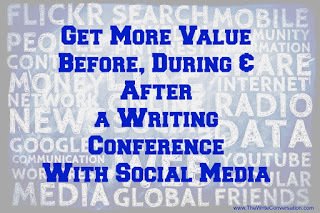 Many writers have the mistaken idea that social networking is only beneficial online. Or that it only helps when you can’t be at an event. Not true.
Many writers have the mistaken idea that social networking is only beneficial online. Or that it only helps when you can’t be at an event. Not true.
While it’s true that social networking can help you plug in when you’re not at a conference or event—many miss the benefits of networking online before and during the conference.Here are just a few of the benefits you’ll find:The ability to connect with others who’ll also be attending the conference. This can make coming to a huge event more like a reunion than a reason for anxiety medicine.The chance to find out what industry professionals are looking for in advance. It can also give you the opportunity to find out the way the interact with others and even some of their pet peeves.The opportunity for the faculty, staff, and other attendees to get to know you in a positive way. If you take the time to introduce yourself online and interact, you can already be ahead of the game when it comes to being remembered after the conference is over.The inside scoop. It’s an unwritten rule that the bigger the conference, the more last minute changes occur. You can be one of the first to know what’s happening and already have a plan in place before most of the attendees know what’s happening.
So how do you make these valuable pre-conference connections? There are several ways and I recommend you use as many as you have time for. Not everyone is on all the social networks, so utilizing more than one can give you better results.
The very first place to start is on the conference website. As a conference director myself, I’m always amazed at the number of people who don’t take advantage of the resources we have on our site. It will definitely make you stand out in a good way if you take the time to read the info on the site.
So what info is valuable for social networking?First and foremost the conference blog.Frequently there’ll be guest posts from faculty with extra, valuable information. There also may be posts about the culture of the conference. By that I mean the expectations of those on staff and attending. What is the expected attire of attendees, are there any special events that require or expect attendees to dress up, even how many people will be there.e-Loops. These are email loops that provide the opportunity for attendees to interact with each other and/or the staff and faculty. Some conferences have different loops for different genres, others have one general loop, and still others offer something for first-time attendees. You’ll never know what’s available unless you look.Conference Facebook Page.This is another opportunity to connect with attendees and faculty. Be sure to Like the page to take advantage of all the networking options.Conference Twitter Account. This is a great account to follow on Twitter because of the information that can be gleaned. You’ll also be able to find out what the conference #Hashtags are. (A hashtag is a number sign in front of a group of letters, numbers, and/or words. There are no spaces within a hashtag and this designation makes the hashtag searchable anywhere within the Twitter universe.)Faculty Page. On this page you should be able to find the websites and blogs of the faculty. Or, if they’re not listed, you’ll at least get the correct spelling to make your own research easier.
So once you’ve exhausted the info on the conference site, then what? Why it’s on the faculty and staff. Here’s what to look for:Blogs and Websites: I start here because this is where most people go to find out about the faculty of a conference. Read the blogs and leave comments. The comments section is also a good place to eavesdrop and find other commenters who’ll be attending the conference.Facebook: Most people who have a blog have a way to connect with them on Facebook there. I don’t recommend you make professional relationships by Friending someone (requesting they become your friend on Facebook). It’s better to let the professional take your online connection to the next level. So Follow their personal page or Like their professional page. You can comment on things they post their and continue the conversation you started on their blog. Once again, don’t neglect to notice who else is on there and whether or not they’ll be attending the conference.Twitter: With Twitter, the etiquette is slightly different so it’s a good idea to find all the faculty and Follow them on Twitter. It’s always a compliment to be mentioned on Twitter, so spread the word about blog posts and comments that have helped you.Google Plus, Pinterest, LinkedIn, etc: All of these are good secondary routes to network prior to a conference, but I recommend them as a second line strategy rather than the first things you go to.
While You’re at the ConferenceNot all the value of social media occurs before the event. Social media is a great way to share the experience with tweeting and sharing pics on Facebook and Instagram.It will also cement you as one of the crowd, when sharing valuable quotes from others at the conference.As mentioned above, most events have an event hashtag and by following it, you can stay up-to-date with any schedule changes or announcements.You can also follow new contacts on social media while you’re with them at the conference.
While all of these things take time, they can exponentially increase the value of a single event. You’re spending good money to go a conference, take the time to get everything you can from it.
What tips have you found for using social media to get more value from a writing conference? Be sure to share your thoughts in the comments section below.
Don't forget to join the conversation!Blessings,Edie
TWEETABLEGet More Value Before, During & After a #Writing Conference with #SocialMedia - @EdieMelson (Click to Tweet)
 Many writers have the mistaken idea that social networking is only beneficial online. Or that it only helps when you can’t be at an event. Not true.
Many writers have the mistaken idea that social networking is only beneficial online. Or that it only helps when you can’t be at an event. Not true.While it’s true that social networking can help you plug in when you’re not at a conference or event—many miss the benefits of networking online before and during the conference.Here are just a few of the benefits you’ll find:The ability to connect with others who’ll also be attending the conference. This can make coming to a huge event more like a reunion than a reason for anxiety medicine.The chance to find out what industry professionals are looking for in advance. It can also give you the opportunity to find out the way the interact with others and even some of their pet peeves.The opportunity for the faculty, staff, and other attendees to get to know you in a positive way. If you take the time to introduce yourself online and interact, you can already be ahead of the game when it comes to being remembered after the conference is over.The inside scoop. It’s an unwritten rule that the bigger the conference, the more last minute changes occur. You can be one of the first to know what’s happening and already have a plan in place before most of the attendees know what’s happening.
So how do you make these valuable pre-conference connections? There are several ways and I recommend you use as many as you have time for. Not everyone is on all the social networks, so utilizing more than one can give you better results.
The very first place to start is on the conference website. As a conference director myself, I’m always amazed at the number of people who don’t take advantage of the resources we have on our site. It will definitely make you stand out in a good way if you take the time to read the info on the site.
So what info is valuable for social networking?First and foremost the conference blog.Frequently there’ll be guest posts from faculty with extra, valuable information. There also may be posts about the culture of the conference. By that I mean the expectations of those on staff and attending. What is the expected attire of attendees, are there any special events that require or expect attendees to dress up, even how many people will be there.e-Loops. These are email loops that provide the opportunity for attendees to interact with each other and/or the staff and faculty. Some conferences have different loops for different genres, others have one general loop, and still others offer something for first-time attendees. You’ll never know what’s available unless you look.Conference Facebook Page.This is another opportunity to connect with attendees and faculty. Be sure to Like the page to take advantage of all the networking options.Conference Twitter Account. This is a great account to follow on Twitter because of the information that can be gleaned. You’ll also be able to find out what the conference #Hashtags are. (A hashtag is a number sign in front of a group of letters, numbers, and/or words. There are no spaces within a hashtag and this designation makes the hashtag searchable anywhere within the Twitter universe.)Faculty Page. On this page you should be able to find the websites and blogs of the faculty. Or, if they’re not listed, you’ll at least get the correct spelling to make your own research easier.
So once you’ve exhausted the info on the conference site, then what? Why it’s on the faculty and staff. Here’s what to look for:Blogs and Websites: I start here because this is where most people go to find out about the faculty of a conference. Read the blogs and leave comments. The comments section is also a good place to eavesdrop and find other commenters who’ll be attending the conference.Facebook: Most people who have a blog have a way to connect with them on Facebook there. I don’t recommend you make professional relationships by Friending someone (requesting they become your friend on Facebook). It’s better to let the professional take your online connection to the next level. So Follow their personal page or Like their professional page. You can comment on things they post their and continue the conversation you started on their blog. Once again, don’t neglect to notice who else is on there and whether or not they’ll be attending the conference.Twitter: With Twitter, the etiquette is slightly different so it’s a good idea to find all the faculty and Follow them on Twitter. It’s always a compliment to be mentioned on Twitter, so spread the word about blog posts and comments that have helped you.Google Plus, Pinterest, LinkedIn, etc: All of these are good secondary routes to network prior to a conference, but I recommend them as a second line strategy rather than the first things you go to.
While You’re at the ConferenceNot all the value of social media occurs before the event. Social media is a great way to share the experience with tweeting and sharing pics on Facebook and Instagram.It will also cement you as one of the crowd, when sharing valuable quotes from others at the conference.As mentioned above, most events have an event hashtag and by following it, you can stay up-to-date with any schedule changes or announcements.You can also follow new contacts on social media while you’re with them at the conference.
While all of these things take time, they can exponentially increase the value of a single event. You’re spending good money to go a conference, take the time to get everything you can from it.
What tips have you found for using social media to get more value from a writing conference? Be sure to share your thoughts in the comments section below.
Don't forget to join the conversation!Blessings,Edie
TWEETABLEGet More Value Before, During & After a #Writing Conference with #SocialMedia - @EdieMelson (Click to Tweet)
Published on May 23, 2016 01:00
May 20, 2016
Some Hard Truths About Being a Professional Writer
by Edie Melson @EdieMelson
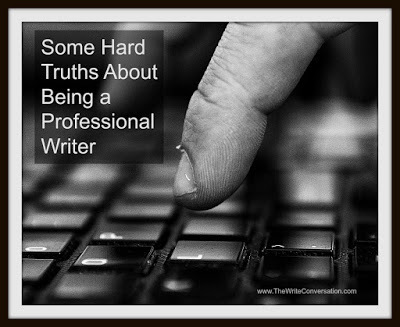 Some hard truths about being a professional writer.True confession time.
Some hard truths about being a professional writer.True confession time.
Writing is both the thing I love best and the thing I hate most.
When the words flow, it’s heaven on earth. When they stutter to a halt, the opposite is true. And the truth is, both of these circumstances are a regular part of the writer’s life.
We write when we feel like, and when we don’t; when we’re inspired, and when we’re not. Most of all we write because we have to. Putting words on paper is life to some of us and an addiction without a recovery group.The time to write isn’t something we find. It’s something we sacrifice for, carving it out of lives that are as busy as anyone else. I get so weary of wanna-be writers complaining about no time to write.
I have author friends who don’t have the time either. One author I know honored a deadline even though his granddaughter was having brain surgery—he wrote in the hospital waiting room. Another, a stay-at-home mom, had just the opportunity of a contract and she wrote in the ten and fifteen minutes breaks available while caring for a special needs daughter, a preschooler and a toddler.
 Writing requires a sacrifice.I could share story after story after story about how writers I know have sacrificed to follow their vocation—all true. The truth is that we all have the same 24 hours in a day and we all have the choice of how to spend them.
Writing requires a sacrifice.I could share story after story after story about how writers I know have sacrificed to follow their vocation—all true. The truth is that we all have the same 24 hours in a day and we all have the choice of how to spend them.
“If you can imagine yourself doing anything else besides writing—do it!”
I’ve been known to give this advice to those just starting out—because they still have time to turn back. I’m a hopeless case. I’ll write myself into a grave and hopefully beyond.
Becoming a writer is a decision—followed by a life of choices that enable us to live out that commitment.
Here are some of the hard choices you’ll need to make to find writing success:Trading TV time for writing time.(You’ll need those hours to put words on paper.)Committing to a lifetime of learningand staying current with the publishing industry. (The industry is changing a lightning speed, either keep up or die.) Saying no to good things is saying yes to writing time.Saying no to the good things, so you’ll have time to say yes to the best things. (Writing is an isolated life a lot of the time.)A willingness to write through the junk to get to gems. (Good writing is rewriting—don’t let anyone tell you otherwise.)The necessity of checking your ego at the door. (There’s always someone more talented, successful, lucky, etc. Get over it and move on.)A willingness to trust other professionals (like your agent and your editor).An unwillingness to compromise what truly matters. (And no this does NOT contradict #6)Trading talking about writing for actually putting words on the page. (Networking is important, but not as important as writing)The commitment to keep going when the odds seem impossible. (In this industry impossible odds is the new normal.)
Saying no to good things is saying yes to writing time.Saying no to the good things, so you’ll have time to say yes to the best things. (Writing is an isolated life a lot of the time.)A willingness to write through the junk to get to gems. (Good writing is rewriting—don’t let anyone tell you otherwise.)The necessity of checking your ego at the door. (There’s always someone more talented, successful, lucky, etc. Get over it and move on.)A willingness to trust other professionals (like your agent and your editor).An unwillingness to compromise what truly matters. (And no this does NOT contradict #6)Trading talking about writing for actually putting words on the page. (Networking is important, but not as important as writing)The commitment to keep going when the odds seem impossible. (In this industry impossible odds is the new normal.)
Well, this is my list. It’s your turn to add your thoughts. You all always have such valuable insights, please share them below in the comments section.
Don't forget to join the conversation!
Blessings,
Edie
TWEETABLES
Some Hard Truths About Being a Professional Writer - @EdieMelson (Click to Tweet)
#Writing is both the thing I love best & the thing I hate most - @EdieMelson (Click to Tweet)
 Some hard truths about being a professional writer.True confession time.
Some hard truths about being a professional writer.True confession time.Writing is both the thing I love best and the thing I hate most.
When the words flow, it’s heaven on earth. When they stutter to a halt, the opposite is true. And the truth is, both of these circumstances are a regular part of the writer’s life.
We write when we feel like, and when we don’t; when we’re inspired, and when we’re not. Most of all we write because we have to. Putting words on paper is life to some of us and an addiction without a recovery group.The time to write isn’t something we find. It’s something we sacrifice for, carving it out of lives that are as busy as anyone else. I get so weary of wanna-be writers complaining about no time to write.
I have author friends who don’t have the time either. One author I know honored a deadline even though his granddaughter was having brain surgery—he wrote in the hospital waiting room. Another, a stay-at-home mom, had just the opportunity of a contract and she wrote in the ten and fifteen minutes breaks available while caring for a special needs daughter, a preschooler and a toddler.
 Writing requires a sacrifice.I could share story after story after story about how writers I know have sacrificed to follow their vocation—all true. The truth is that we all have the same 24 hours in a day and we all have the choice of how to spend them.
Writing requires a sacrifice.I could share story after story after story about how writers I know have sacrificed to follow their vocation—all true. The truth is that we all have the same 24 hours in a day and we all have the choice of how to spend them.“If you can imagine yourself doing anything else besides writing—do it!”
I’ve been known to give this advice to those just starting out—because they still have time to turn back. I’m a hopeless case. I’ll write myself into a grave and hopefully beyond.
Becoming a writer is a decision—followed by a life of choices that enable us to live out that commitment.
Here are some of the hard choices you’ll need to make to find writing success:Trading TV time for writing time.(You’ll need those hours to put words on paper.)Committing to a lifetime of learningand staying current with the publishing industry. (The industry is changing a lightning speed, either keep up or die.)
 Saying no to good things is saying yes to writing time.Saying no to the good things, so you’ll have time to say yes to the best things. (Writing is an isolated life a lot of the time.)A willingness to write through the junk to get to gems. (Good writing is rewriting—don’t let anyone tell you otherwise.)The necessity of checking your ego at the door. (There’s always someone more talented, successful, lucky, etc. Get over it and move on.)A willingness to trust other professionals (like your agent and your editor).An unwillingness to compromise what truly matters. (And no this does NOT contradict #6)Trading talking about writing for actually putting words on the page. (Networking is important, but not as important as writing)The commitment to keep going when the odds seem impossible. (In this industry impossible odds is the new normal.)
Saying no to good things is saying yes to writing time.Saying no to the good things, so you’ll have time to say yes to the best things. (Writing is an isolated life a lot of the time.)A willingness to write through the junk to get to gems. (Good writing is rewriting—don’t let anyone tell you otherwise.)The necessity of checking your ego at the door. (There’s always someone more talented, successful, lucky, etc. Get over it and move on.)A willingness to trust other professionals (like your agent and your editor).An unwillingness to compromise what truly matters. (And no this does NOT contradict #6)Trading talking about writing for actually putting words on the page. (Networking is important, but not as important as writing)The commitment to keep going when the odds seem impossible. (In this industry impossible odds is the new normal.)Well, this is my list. It’s your turn to add your thoughts. You all always have such valuable insights, please share them below in the comments section.
Don't forget to join the conversation!
Blessings,
Edie
TWEETABLES
Some Hard Truths About Being a Professional Writer - @EdieMelson (Click to Tweet)
#Writing is both the thing I love best & the thing I hate most - @EdieMelson (Click to Tweet)
Published on May 20, 2016 01:00
May 19, 2016
5 Ways to Write Using the Five Senses—Sight
by Cyle Young @CyleYoung
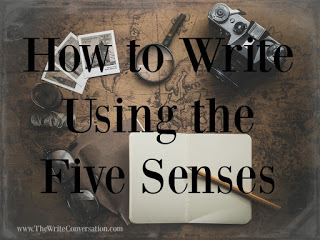 For the average writer, sight, is typically the easiest of the five senses to describe. Our world is filled with a menagerie of colors, people, plants, animals, buildings, and things. Each of those objects are finite and can be described visually, making sight easy to relate on paper.
For the average writer, sight, is typically the easiest of the five senses to describe. Our world is filled with a menagerie of colors, people, plants, animals, buildings, and things. Each of those objects are finite and can be described visually, making sight easy to relate on paper.
But describing the sense of sight doesn’t have to be bland. Take for instance, the picture below.
What do you see?

Most people see a whitewashed glacial landscape void of personality and excitement. Some would describe this as, “snow and ice covered the ground and tall snow-capped peaks stood far off in the distance”.
In fairness, that is an adequate description, but it lacks pizazz. It lacks personality. And more than anything else, it lacks a developed sense of sight.
Take sixty-seconds and write what you see in the scene shown in the aforementioned picture.
What do you see now?
How would you describe the shallow turquoise lake as its color darkens to a chilly cerulean blue before disappearing into the midnight depths of the central crevice?
What about the mountains? Are they snow-capped? Or does the snow creep down the mountainside in wispy white fingers before being swallowed by the soulless shadow mountains?
Is it a snowy white glacier? Or do you see the pockmarks, the spashes of dirt and sediment, and the areas smoothed by the run-off?
Take a deeper look. Imagine you are standing on this glacier. See the lake. Peer at the mountain. Watch the wind blow across the landscape.
Now what do you see?
Leave your unique description of what you “see” in the comments below. And make sure to take the time to always peer into your scene, setting, or storyworld and describe and your characters in an exceptionally engaging way.
TWEETABLES
5 Ways to Write Using the Five Senses—Sight - @CyleYoung on @EdieMelson (Click to Tweet)
Describing something we see doesn't have to be bland - @CyleYoung (Click to Tweet)
 Cyle Young is thankful God blessed him with the uniqueness of being an ADD-riddled…SQUIRREL!...binge writer. Not much unlike the classic video game Frogger, Cyle darts back and forth between various writing genres. He crafts princess children’s stories, how-to advice for parents, epic fantasy tales, and easy readers.
Cyle Young is thankful God blessed him with the uniqueness of being an ADD-riddled…SQUIRREL!...binge writer. Not much unlike the classic video game Frogger, Cyle darts back and forth between various writing genres. He crafts princess children’s stories, how-to advice for parents, epic fantasy tales, and easy readers.
 For the average writer, sight, is typically the easiest of the five senses to describe. Our world is filled with a menagerie of colors, people, plants, animals, buildings, and things. Each of those objects are finite and can be described visually, making sight easy to relate on paper.
For the average writer, sight, is typically the easiest of the five senses to describe. Our world is filled with a menagerie of colors, people, plants, animals, buildings, and things. Each of those objects are finite and can be described visually, making sight easy to relate on paper.But describing the sense of sight doesn’t have to be bland. Take for instance, the picture below.
What do you see?

Most people see a whitewashed glacial landscape void of personality and excitement. Some would describe this as, “snow and ice covered the ground and tall snow-capped peaks stood far off in the distance”.
In fairness, that is an adequate description, but it lacks pizazz. It lacks personality. And more than anything else, it lacks a developed sense of sight.
Take sixty-seconds and write what you see in the scene shown in the aforementioned picture.
What do you see now?
How would you describe the shallow turquoise lake as its color darkens to a chilly cerulean blue before disappearing into the midnight depths of the central crevice?
What about the mountains? Are they snow-capped? Or does the snow creep down the mountainside in wispy white fingers before being swallowed by the soulless shadow mountains?
Is it a snowy white glacier? Or do you see the pockmarks, the spashes of dirt and sediment, and the areas smoothed by the run-off?
Take a deeper look. Imagine you are standing on this glacier. See the lake. Peer at the mountain. Watch the wind blow across the landscape.
Now what do you see?
Leave your unique description of what you “see” in the comments below. And make sure to take the time to always peer into your scene, setting, or storyworld and describe and your characters in an exceptionally engaging way.
TWEETABLES
5 Ways to Write Using the Five Senses—Sight - @CyleYoung on @EdieMelson (Click to Tweet)
Describing something we see doesn't have to be bland - @CyleYoung (Click to Tweet)
 Cyle Young is thankful God blessed him with the uniqueness of being an ADD-riddled…SQUIRREL!...binge writer. Not much unlike the classic video game Frogger, Cyle darts back and forth between various writing genres. He crafts princess children’s stories, how-to advice for parents, epic fantasy tales, and easy readers.
Cyle Young is thankful God blessed him with the uniqueness of being an ADD-riddled…SQUIRREL!...binge writer. Not much unlike the classic video game Frogger, Cyle darts back and forth between various writing genres. He crafts princess children’s stories, how-to advice for parents, epic fantasy tales, and easy readers.
Published on May 19, 2016 01:00
May 18, 2016
Defeating a Writer's Self Doubt
by Katy Kauffman @KatyKauffman28
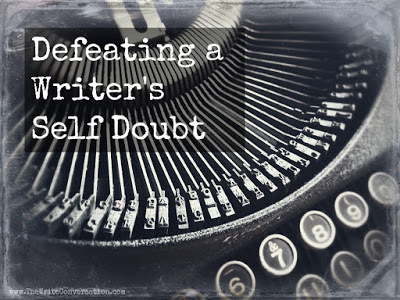 Defeating writer's self doubt.I don’t know how many times I’ve thought, I can’t do this.
Defeating writer's self doubt.I don’t know how many times I’ve thought, I can’t do this.
Writing books. Editing books. Finishing blog posts on time. Thinking up ideas to write about. Talking to people about my writing. Encouraging others to write. I wondered if I could do it.
Self-doubt likes to whisper joy-stealing, fear-fueled lies into our lives.
When God called Moses to lead His people out of slavery in Egypt to a new land, Moses had five doubts or questions.Who am I to do this? (Exodus 3:11)Who are You if they should ask me? (Exodus 3:13)Suppose they won’t listen? (Exodus 4:1)I’m not eloquent. (Exodus 4:10)Please send someone else! (Exodus 4:13)
 God answered Moses' questions with truth.God answered Moses’ questions with the truth—He would be with him. He gave Moses evidence that He would go with him, and He commissioned his brother Aaron to be a companion in the adventure. God has adventures in store for us, if we will trust Him.
God answered Moses' questions with truth.God answered Moses’ questions with the truth—He would be with him. He gave Moses evidence that He would go with him, and He commissioned his brother Aaron to be a companion in the adventure. God has adventures in store for us, if we will trust Him.
God knows how to answer our doubts and questions. Here’s what Moses’ list would sound like coming from a writer and what God might say in response to it.Who am I? I’m not a natural writer. … I will be with you. I have called you to write and will teach you.Will anyone want to listen? … If I have called you, I will use your words to bless others.Will I ever have a way to be heard? … I will provide an avenue for that to happen.I’m not eloquent! … I will be with your pen (or keyboard) and guide you.Please call someone else! … Here’s a writers group to belong to. You don’t have to be on your own in this. In the writing journey, you're not alone.In the writing journey, you’re not alone. If God has called you to write, you have Him as your greatest inspiration and strength. You have hundreds—even thousands—of other Christian writers who have similar struggles and questions. The internet and social media is a great way to stay connected, no matter where we live, and to encourage each other in the writing journey. It’s a blessing when a writer can find a local group to belong to and receive encouragement and feedback.
In the writing journey, you're not alone.In the writing journey, you’re not alone. If God has called you to write, you have Him as your greatest inspiration and strength. You have hundreds—even thousands—of other Christian writers who have similar struggles and questions. The internet and social media is a great way to stay connected, no matter where we live, and to encourage each other in the writing journey. It’s a blessing when a writer can find a local group to belong to and receive encouragement and feedback.
Together we can be a strong voice for God in the world. We can share messages of hope and redemption. Don’t let self-doubt keep you from sharing the messages God wants you to write. Refuse the lies and the fear, and turn self-doubt into God-confidence. We write for the One who saves souls and heals hearts. As He strengthens our hearts, we can strengthen others.
Defeat self-doubt by remembering God Himself is with you and by believing He will help you to find the right words and the right way to share them with the world. This world needs more Christian writers who aren’t afraid to let the light shine and to pierce the darkness. Keep your torch bright by refusing self-doubt and by flourishing in the presence and promises of God. Have confidence in Him, and keep writing.
 Katy Kauffman is an award-winning writer and a co-founder of Lighthouse Bible Studies, a ministry which seeks to connect people to God through His Word.
Katy Kauffman is an award-winning writer and a co-founder of Lighthouse Bible Studies, a ministry which seeks to connect people to God through His Word.
She has taught the Bible to women and teens, and has two published Bible studies for women, 2 Timothy: Winning the Victory and Faith, Courage, and Victory. She is an editor of the new Refresh Bible Study Magazine and the designer of Broken but Priceless: The Magazine. She makes her home near Atlanta, Georgia.
 Defeating writer's self doubt.I don’t know how many times I’ve thought, I can’t do this.
Defeating writer's self doubt.I don’t know how many times I’ve thought, I can’t do this. Writing books. Editing books. Finishing blog posts on time. Thinking up ideas to write about. Talking to people about my writing. Encouraging others to write. I wondered if I could do it.
Self-doubt likes to whisper joy-stealing, fear-fueled lies into our lives.
When God called Moses to lead His people out of slavery in Egypt to a new land, Moses had five doubts or questions.Who am I to do this? (Exodus 3:11)Who are You if they should ask me? (Exodus 3:13)Suppose they won’t listen? (Exodus 4:1)I’m not eloquent. (Exodus 4:10)Please send someone else! (Exodus 4:13)
 God answered Moses' questions with truth.God answered Moses’ questions with the truth—He would be with him. He gave Moses evidence that He would go with him, and He commissioned his brother Aaron to be a companion in the adventure. God has adventures in store for us, if we will trust Him.
God answered Moses' questions with truth.God answered Moses’ questions with the truth—He would be with him. He gave Moses evidence that He would go with him, and He commissioned his brother Aaron to be a companion in the adventure. God has adventures in store for us, if we will trust Him. God knows how to answer our doubts and questions. Here’s what Moses’ list would sound like coming from a writer and what God might say in response to it.Who am I? I’m not a natural writer. … I will be with you. I have called you to write and will teach you.Will anyone want to listen? … If I have called you, I will use your words to bless others.Will I ever have a way to be heard? … I will provide an avenue for that to happen.I’m not eloquent! … I will be with your pen (or keyboard) and guide you.Please call someone else! … Here’s a writers group to belong to. You don’t have to be on your own in this.
 In the writing journey, you're not alone.In the writing journey, you’re not alone. If God has called you to write, you have Him as your greatest inspiration and strength. You have hundreds—even thousands—of other Christian writers who have similar struggles and questions. The internet and social media is a great way to stay connected, no matter where we live, and to encourage each other in the writing journey. It’s a blessing when a writer can find a local group to belong to and receive encouragement and feedback.
In the writing journey, you're not alone.In the writing journey, you’re not alone. If God has called you to write, you have Him as your greatest inspiration and strength. You have hundreds—even thousands—of other Christian writers who have similar struggles and questions. The internet and social media is a great way to stay connected, no matter where we live, and to encourage each other in the writing journey. It’s a blessing when a writer can find a local group to belong to and receive encouragement and feedback.Together we can be a strong voice for God in the world. We can share messages of hope and redemption. Don’t let self-doubt keep you from sharing the messages God wants you to write. Refuse the lies and the fear, and turn self-doubt into God-confidence. We write for the One who saves souls and heals hearts. As He strengthens our hearts, we can strengthen others.
Defeat self-doubt by remembering God Himself is with you and by believing He will help you to find the right words and the right way to share them with the world. This world needs more Christian writers who aren’t afraid to let the light shine and to pierce the darkness. Keep your torch bright by refusing self-doubt and by flourishing in the presence and promises of God. Have confidence in Him, and keep writing.
 Katy Kauffman is an award-winning writer and a co-founder of Lighthouse Bible Studies, a ministry which seeks to connect people to God through His Word.
Katy Kauffman is an award-winning writer and a co-founder of Lighthouse Bible Studies, a ministry which seeks to connect people to God through His Word. She has taught the Bible to women and teens, and has two published Bible studies for women, 2 Timothy: Winning the Victory and Faith, Courage, and Victory. She is an editor of the new Refresh Bible Study Magazine and the designer of Broken but Priceless: The Magazine. She makes her home near Atlanta, Georgia.
Published on May 18, 2016 01:00
May 17, 2016
Where Does a Writer Find Encouragement?
by Lucinda Secrest McDowell @LucindaSMcDowel
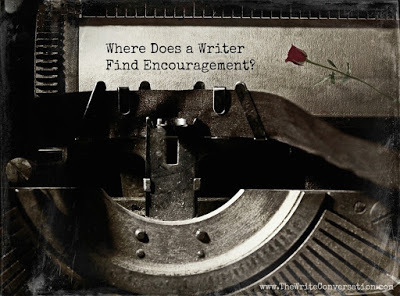 “Cindy, God has given you a gift of writing, and it is your duty to write for Him!”
“Cindy, God has given you a gift of writing, and it is your duty to write for Him!”
Imagine being only 26-years-old and personally hearing those words from Elisabeth Elliot—respected mentor, international speaker and author of more than thirty books. I had already felt a nudging from God on this path of writing, but her words helped confirm and encourage me further. Needless to say, I was a bit daunted, but also energized to pursue more training and opportunity (this happened when I was heading off to Wheaton Graduate School of Communication after graduating from Gordon-Conwell Seminary.)
Believe me, no one is more amazed than I that so many years later, I can look back at my published work, by God’s grace: 12 books authored, 25+ books as contributing author and articles published in more than 50 magazines.
Writers write.
It’s the way we filter life. We don’t always write for publication. Sometimes what we ‘write’ in our minds never makes it to paper or computer, but the stories are there all the same.
As my years increase, so does my wisdom in believing that knowing and telling our stories is perhaps one of the most important ways of participating in furthering God’s Kingdom here on earth. So I am perfectly content at this point to say that I am, indeed, a Storyteller.
“My story is important not because it is mine, God knows, but because if I tell it anything like right, the chances are you will recognize that in many ways it is also yours… it is precisely through these stories in all their particularity, as I have long believed and often said, that God makes Himself known to each of us more powerfully and personally. If this is true, it means that to lose track of our stories is to be profoundly impoverished not only humanly but also spiritually.” (Frederick Buechner in Telling Secrets)
 Writing is a discipline and only happens when we
Writing is a discipline and only happens when we
deliberately make room in our lives to pursue it.Writing is a discipline and only happens when we deliberately make room in our lives to pursue it. My entire life has been filled with people and activity and ministry and drama; and yet I have somehow managed to insert my writing amidst the chaos.
Rarely have I had the luxury to finish a book deadline in complete solitude. Those images of authors working in a cottage by the sea totally undisturbed are not my reality. Most of the time we writers are simply trying to squeeze our craft in between all the other responsibility and serendipity that come our way...
I love what one of my ‘writer heroes’ says: “It will not surprise you if I say that I think being a writer is a fine thing to be. Except for when you actually have to write, of course. Then it is about as exciting as washing dishes. Which is the other thing I do a lot of at my house… Some days I travel somewhere to lead a retreat or speak at a conference. Some days I write letters and answer phone calls as though I were an actual business person, and some days I teach the class at the local high school. I do laundry in between paragraphs on Tuesdays… I wear a lot of hats. Just like everyone else. Some days I feel like a poet and some days I feel like a housekeeper, and some days I cannot tell the difference. I expect most of us feel that way sometimes. Life is made up of a lot of good stuff and a lot of bad stuff, too, and in between you have to clean your room.” (Robert Benson in A Good Life)
Next week I have the great privileged to serve on the faculty of the Blue Ridge MountainsChristian Writers Conference near Asheville, North Carolina. Long time a dream of mine (since I first attended back in 1987), I look forward to both formal and informal times of teaching and helping writers discover more creative ways to tell their unique story within the greater Kingdom Story.
This is my sweet spot. Doing what God created me to do. Encourage. Speak. Empower. Challenge. Tell Stories.
Now I'm the one telling that 26-year-old I meet that God has given her a gift of writing and it is her duty to write for Him...
So I will Keep Writing.
And I will also Keep Encouraging Writers.
Trusting God for the fruit...
TWEETABLES
Where does a writer find #encouragement? @LucindaSMcDowel (Click to Tweet)
"Keep #writing and trusting God for the fruit..." @LucindaSMcDowel (Click to Tweet)
 Lucinda Secrest McDowell, M.T.S., is the author of 11 books, contributing author to 25 books, and has published in more than 50 magazines. A graduate of Gordon-Conwell Theological Seminary and Furman University, she studied at the Wheaton Graduate School of Communication and served as Communications Specialist for the Lausanne Committee for World Evangelization (Thailand) and Editor for Billy Graham’s International Conference for Itinerant Evangelists (Netherlands). A member of Advanced Writers and Speakers Association (AWSA), she has received “Writer of the Year” awards from both Mt. Hermon and Blue Ridge Writers Conferences. Cindy speaks internationally through her ministry “Encouraging Words” and co-directs the New England Christian Writers Retreat. Known for her ability to convey deep truth in practical and winsome ways, she writes from “Sunnyside” cottage in New England. Visit her online at www.EncouragingWords.net
Lucinda Secrest McDowell, M.T.S., is the author of 11 books, contributing author to 25 books, and has published in more than 50 magazines. A graduate of Gordon-Conwell Theological Seminary and Furman University, she studied at the Wheaton Graduate School of Communication and served as Communications Specialist for the Lausanne Committee for World Evangelization (Thailand) and Editor for Billy Graham’s International Conference for Itinerant Evangelists (Netherlands). A member of Advanced Writers and Speakers Association (AWSA), she has received “Writer of the Year” awards from both Mt. Hermon and Blue Ridge Writers Conferences. Cindy speaks internationally through her ministry “Encouraging Words” and co-directs the New England Christian Writers Retreat. Known for her ability to convey deep truth in practical and winsome ways, she writes from “Sunnyside” cottage in New England. Visit her online at www.EncouragingWords.net
Links www.NewEnglandChristianWritersRetreat.com
Blog/website www.EncouragingWords.net
 “Cindy, God has given you a gift of writing, and it is your duty to write for Him!”
“Cindy, God has given you a gift of writing, and it is your duty to write for Him!”
Imagine being only 26-years-old and personally hearing those words from Elisabeth Elliot—respected mentor, international speaker and author of more than thirty books. I had already felt a nudging from God on this path of writing, but her words helped confirm and encourage me further. Needless to say, I was a bit daunted, but also energized to pursue more training and opportunity (this happened when I was heading off to Wheaton Graduate School of Communication after graduating from Gordon-Conwell Seminary.)
Believe me, no one is more amazed than I that so many years later, I can look back at my published work, by God’s grace: 12 books authored, 25+ books as contributing author and articles published in more than 50 magazines.
Writers write.
It’s the way we filter life. We don’t always write for publication. Sometimes what we ‘write’ in our minds never makes it to paper or computer, but the stories are there all the same.
As my years increase, so does my wisdom in believing that knowing and telling our stories is perhaps one of the most important ways of participating in furthering God’s Kingdom here on earth. So I am perfectly content at this point to say that I am, indeed, a Storyteller.
“My story is important not because it is mine, God knows, but because if I tell it anything like right, the chances are you will recognize that in many ways it is also yours… it is precisely through these stories in all their particularity, as I have long believed and often said, that God makes Himself known to each of us more powerfully and personally. If this is true, it means that to lose track of our stories is to be profoundly impoverished not only humanly but also spiritually.” (Frederick Buechner in Telling Secrets)
 Writing is a discipline and only happens when we
Writing is a discipline and only happens when wedeliberately make room in our lives to pursue it.Writing is a discipline and only happens when we deliberately make room in our lives to pursue it. My entire life has been filled with people and activity and ministry and drama; and yet I have somehow managed to insert my writing amidst the chaos.
Rarely have I had the luxury to finish a book deadline in complete solitude. Those images of authors working in a cottage by the sea totally undisturbed are not my reality. Most of the time we writers are simply trying to squeeze our craft in between all the other responsibility and serendipity that come our way...
I love what one of my ‘writer heroes’ says: “It will not surprise you if I say that I think being a writer is a fine thing to be. Except for when you actually have to write, of course. Then it is about as exciting as washing dishes. Which is the other thing I do a lot of at my house… Some days I travel somewhere to lead a retreat or speak at a conference. Some days I write letters and answer phone calls as though I were an actual business person, and some days I teach the class at the local high school. I do laundry in between paragraphs on Tuesdays… I wear a lot of hats. Just like everyone else. Some days I feel like a poet and some days I feel like a housekeeper, and some days I cannot tell the difference. I expect most of us feel that way sometimes. Life is made up of a lot of good stuff and a lot of bad stuff, too, and in between you have to clean your room.” (Robert Benson in A Good Life)
Next week I have the great privileged to serve on the faculty of the Blue Ridge MountainsChristian Writers Conference near Asheville, North Carolina. Long time a dream of mine (since I first attended back in 1987), I look forward to both formal and informal times of teaching and helping writers discover more creative ways to tell their unique story within the greater Kingdom Story.
This is my sweet spot. Doing what God created me to do. Encourage. Speak. Empower. Challenge. Tell Stories.
Now I'm the one telling that 26-year-old I meet that God has given her a gift of writing and it is her duty to write for Him...
So I will Keep Writing.
And I will also Keep Encouraging Writers.
Trusting God for the fruit...
TWEETABLES
Where does a writer find #encouragement? @LucindaSMcDowel (Click to Tweet)
"Keep #writing and trusting God for the fruit..." @LucindaSMcDowel (Click to Tweet)
 Lucinda Secrest McDowell, M.T.S., is the author of 11 books, contributing author to 25 books, and has published in more than 50 magazines. A graduate of Gordon-Conwell Theological Seminary and Furman University, she studied at the Wheaton Graduate School of Communication and served as Communications Specialist for the Lausanne Committee for World Evangelization (Thailand) and Editor for Billy Graham’s International Conference for Itinerant Evangelists (Netherlands). A member of Advanced Writers and Speakers Association (AWSA), she has received “Writer of the Year” awards from both Mt. Hermon and Blue Ridge Writers Conferences. Cindy speaks internationally through her ministry “Encouraging Words” and co-directs the New England Christian Writers Retreat. Known for her ability to convey deep truth in practical and winsome ways, she writes from “Sunnyside” cottage in New England. Visit her online at www.EncouragingWords.net
Lucinda Secrest McDowell, M.T.S., is the author of 11 books, contributing author to 25 books, and has published in more than 50 magazines. A graduate of Gordon-Conwell Theological Seminary and Furman University, she studied at the Wheaton Graduate School of Communication and served as Communications Specialist for the Lausanne Committee for World Evangelization (Thailand) and Editor for Billy Graham’s International Conference for Itinerant Evangelists (Netherlands). A member of Advanced Writers and Speakers Association (AWSA), she has received “Writer of the Year” awards from both Mt. Hermon and Blue Ridge Writers Conferences. Cindy speaks internationally through her ministry “Encouraging Words” and co-directs the New England Christian Writers Retreat. Known for her ability to convey deep truth in practical and winsome ways, she writes from “Sunnyside” cottage in New England. Visit her online at www.EncouragingWords.netLinks www.NewEnglandChristianWritersRetreat.com
Blog/website www.EncouragingWords.net
Published on May 17, 2016 01:00
May 16, 2016
Facebook Branded Content Policy for Pages & How it Affects the Little Guys
by Edie Melson @EdieMelson

Lately I’ve been contacted by quite a few panicked Facebook users confused over the the New Branded Content Policy for Professional Pages. I promised to do the research and share what I’ve learned. Today I’m making good on that promise. (And at the end of the post, I’ll share some posts from other professionals about this policy.)
 The pink arrow points to the blue check mark on
The pink arrow points to the blue check mark on
Ted Dekker's verified page.For instance, J.K. Rowling has a verified page, as does Ted Dekker. I do not qualify for a verified page. And I for one am glad, because this policy is going to be strictly enforced.
The policy states that anything the verified page is paid to promote—such as affiliate links—needs to be disclosed within the post. This would also hold true for Amazon links, if you’re getting money as an Amazon associate.
For those of us who do not own verified pages, we are welcome to share third party links—like blog posts we deem valuable from other sites. This doesn’t violate any policy and falls in line with the Facebook culture. It was started as a social site where people could share things of interest with their friends.
However, it is a good practice to let people know if we’re being paid to promote something on Facebook—especially on a professional page. It’s my personal opinion that this move stems from the fact that Facebook is trying to track all the ways others are being paid for advertising on Facebook.
NOTE: Remember the difference between a professional page and a personal profile. A professional page is where you LIKE something. A personal profile is where you FRIEND or FOLLOW someone.
 Professional pages are finding it more and more
Professional pages are finding it more and more
difficult to reach their audience without paying.Professional pages—even those not verified—are finding it more and more difficult to reach their audience without paying. This isn’t by accident.
Since going public, Facebook is now accountable to stockholders who expect their investment to earn them money. That means Facebook must find ways to monetize this once free endeavor.
The days of free advertising on Facebook are quickly becoming a thing of the past. We need to be ready for this new paradigm and make sure we aren’t counting on Facebook (or any other social media network) as the sole way of connecting with our audience. It’s more important than ever before to have a blog site where we our readers can find us—no matter what happens on social media. And even more than that—a place where we can collect email address and build our own list of contacts.
Now it’s your turn. What questions do you have about this new Facebook policy, or Facebook in general. Be sure to leave your thoughts in the comments section below.
Don’t forget to join the conversation!Blessings,Edie
TWEETABLESDon’t let Facebook’s Branded Content Policy for Pages Scare You, Here’s Why - @EdieMelson (Click to Tweet)
Facebook Branded Content Policy for Pages & How it Affects the Little Guys – @EdieMelson (Click to Tweet)
Additional resources:http://bloggingbistro.com/facebook-branded-content-policy/http://www.socialmediaexaminer.com/facebook-branded-content-what-marketers-need-to-know/ https://www.facebook.com/facebookmedia/get-started/branded-content

Lately I’ve been contacted by quite a few panicked Facebook users confused over the the New Branded Content Policy for Professional Pages. I promised to do the research and share what I’ve learned. Today I’m making good on that promise. (And at the end of the post, I’ll share some posts from other professionals about this policy.)
 The pink arrow points to the blue check mark on
The pink arrow points to the blue check mark onTed Dekker's verified page.For instance, J.K. Rowling has a verified page, as does Ted Dekker. I do not qualify for a verified page. And I for one am glad, because this policy is going to be strictly enforced.
The policy states that anything the verified page is paid to promote—such as affiliate links—needs to be disclosed within the post. This would also hold true for Amazon links, if you’re getting money as an Amazon associate.
For those of us who do not own verified pages, we are welcome to share third party links—like blog posts we deem valuable from other sites. This doesn’t violate any policy and falls in line with the Facebook culture. It was started as a social site where people could share things of interest with their friends.
However, it is a good practice to let people know if we’re being paid to promote something on Facebook—especially on a professional page. It’s my personal opinion that this move stems from the fact that Facebook is trying to track all the ways others are being paid for advertising on Facebook.
NOTE: Remember the difference between a professional page and a personal profile. A professional page is where you LIKE something. A personal profile is where you FRIEND or FOLLOW someone.
 Professional pages are finding it more and more
Professional pages are finding it more and moredifficult to reach their audience without paying.Professional pages—even those not verified—are finding it more and more difficult to reach their audience without paying. This isn’t by accident.
Since going public, Facebook is now accountable to stockholders who expect their investment to earn them money. That means Facebook must find ways to monetize this once free endeavor.
The days of free advertising on Facebook are quickly becoming a thing of the past. We need to be ready for this new paradigm and make sure we aren’t counting on Facebook (or any other social media network) as the sole way of connecting with our audience. It’s more important than ever before to have a blog site where we our readers can find us—no matter what happens on social media. And even more than that—a place where we can collect email address and build our own list of contacts.
Now it’s your turn. What questions do you have about this new Facebook policy, or Facebook in general. Be sure to leave your thoughts in the comments section below.
Don’t forget to join the conversation!Blessings,Edie
TWEETABLESDon’t let Facebook’s Branded Content Policy for Pages Scare You, Here’s Why - @EdieMelson (Click to Tweet)
Facebook Branded Content Policy for Pages & How it Affects the Little Guys – @EdieMelson (Click to Tweet)
Additional resources:http://bloggingbistro.com/facebook-branded-content-policy/http://www.socialmediaexaminer.com/facebook-branded-content-what-marketers-need-to-know/ https://www.facebook.com/facebookmedia/get-started/branded-content
Published on May 16, 2016 01:00
May 15, 2016
Walk Worthy
by Edie Melson @EdieMelson
 Everywhere we turn fitness is all the rage. And the newest twist on the trend—keeping track of our personal fitness. We’re wearing jewelry that tracks our steps, our heart rate, and even how many stairs we climb. Beyond that, it reminds us when we need to exercise or at least get up and move.
Everywhere we turn fitness is all the rage. And the newest twist on the trend—keeping track of our personal fitness. We’re wearing jewelry that tracks our steps, our heart rate, and even how many stairs we climb. Beyond that, it reminds us when we need to exercise or at least get up and move.
Thinking about all this accountability has turned my mind to spiritual accountability. Wouldn’t it be amazing if we had something to track our spiritual walk?
Can you imagine how helpful it would be if, when we slacked off on spiritual fitness and discipline, there was something that would tell us it was time to get back on track?
 Truthfully we do—the Holy Spirit.
Truthfully we do—the Holy Spirit.
He’s always with us—to teach us, interpret Scripture and circumstances, and remind us when we get off track. But He’s the ultimate gentleman. He doesn’t force us back on the path, and if we ignore Him often enough, He’ll just be quiet.
Beyond that important personal of the Trinity who lives inside us, are those fellow believers that surround us. Scripture encourages us to be accountable to one another. But we so often ignore that admonition. It’s scary to be honest enough with someone else to enter into an accountability relationship.
Here is the way I manage accountability in my life:1. Personally, I have an accountability partner. She’s a dear friend who loves me in spite of my faults. I don’t feel judged by her—even when she reminds me that it’s time to get back on track. It’s a precious relationship and one that guard and take care to nurture.
2. I also have an accountability group. We began as a few women from my Sunday school class, but it’s grown beyond that. We meet every Friday morning at a local coffee shop. We share cares, concerns, and prayers. Those in the group encourage one another, pray for one another, and go after members of the group who have slacked off. We don’t hound each other, but we remind our fellow sisters that we are loved, we are blessed, and we have a responsibility to stay strong in our walk.
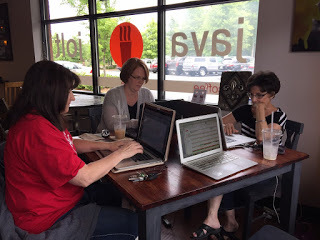 3. Finally, as a Christian who writes, I have an accountability group of fellow writers.These women are my lifeline. The help me remember the gift of words that God has given me, and that along with that gift, comes the responsibility to grow and practice that gift.
3. Finally, as a Christian who writes, I have an accountability group of fellow writers.These women are my lifeline. The help me remember the gift of words that God has given me, and that along with that gift, comes the responsibility to grow and practice that gift.
Accountability is good thing to stay physically healthy. It’s even more important to have the same sort of accountability to stay in shape spiritually.
So that you may walk worthy of the Lord, fully pleasing to Him, bearing fruit in every good work and growing in the knowledge of God. Colossians 1:10 (HCSB)
 Everywhere we turn fitness is all the rage. And the newest twist on the trend—keeping track of our personal fitness. We’re wearing jewelry that tracks our steps, our heart rate, and even how many stairs we climb. Beyond that, it reminds us when we need to exercise or at least get up and move.
Everywhere we turn fitness is all the rage. And the newest twist on the trend—keeping track of our personal fitness. We’re wearing jewelry that tracks our steps, our heart rate, and even how many stairs we climb. Beyond that, it reminds us when we need to exercise or at least get up and move. Thinking about all this accountability has turned my mind to spiritual accountability. Wouldn’t it be amazing if we had something to track our spiritual walk?
Can you imagine how helpful it would be if, when we slacked off on spiritual fitness and discipline, there was something that would tell us it was time to get back on track?
 Truthfully we do—the Holy Spirit.
Truthfully we do—the Holy Spirit. He’s always with us—to teach us, interpret Scripture and circumstances, and remind us when we get off track. But He’s the ultimate gentleman. He doesn’t force us back on the path, and if we ignore Him often enough, He’ll just be quiet.
Beyond that important personal of the Trinity who lives inside us, are those fellow believers that surround us. Scripture encourages us to be accountable to one another. But we so often ignore that admonition. It’s scary to be honest enough with someone else to enter into an accountability relationship.
Here is the way I manage accountability in my life:1. Personally, I have an accountability partner. She’s a dear friend who loves me in spite of my faults. I don’t feel judged by her—even when she reminds me that it’s time to get back on track. It’s a precious relationship and one that guard and take care to nurture.
2. I also have an accountability group. We began as a few women from my Sunday school class, but it’s grown beyond that. We meet every Friday morning at a local coffee shop. We share cares, concerns, and prayers. Those in the group encourage one another, pray for one another, and go after members of the group who have slacked off. We don’t hound each other, but we remind our fellow sisters that we are loved, we are blessed, and we have a responsibility to stay strong in our walk.
 3. Finally, as a Christian who writes, I have an accountability group of fellow writers.These women are my lifeline. The help me remember the gift of words that God has given me, and that along with that gift, comes the responsibility to grow and practice that gift.
3. Finally, as a Christian who writes, I have an accountability group of fellow writers.These women are my lifeline. The help me remember the gift of words that God has given me, and that along with that gift, comes the responsibility to grow and practice that gift. Accountability is good thing to stay physically healthy. It’s even more important to have the same sort of accountability to stay in shape spiritually.
So that you may walk worthy of the Lord, fully pleasing to Him, bearing fruit in every good work and growing in the knowledge of God. Colossians 1:10 (HCSB)
Published on May 15, 2016 01:00
May 14, 2016
Learning How to Fall
by Beth Vogt @BethVogt
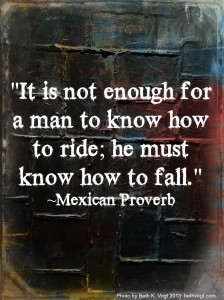
I took karate a number of years ago — okay, a lot of years ago. It’s how I met my husband. He swept me off my feet in a karate studio. To be completely honest, he knocked me down.
Yeah, so romantic.
But here’s the point: In karate, you’re taught how to fall. You practice falling down and getting back up, falling down and getting back up — over and over again. And yes, there is a technique, a bit of skill, to falling well.
I’m wondering, setting aside what I learned in that karate studio, what kind of “When you fall, here’s how you get back up” insights would I share with someone else today?
Something like:
Falls are gonna happen — and they’re gonna hurt. It’s okay to say “ouch” and even cry a bit.Falls — even when you think you’re prepared for them — can cause an unexpected injury. Adjust to it, don’t deny it.Falls mean you need to get back up. Don’t be embarrassed to ask for help. But before you get up, see if there’s anything you learned from your on-the-ground-looking-up perspective.
In Your Words: How would you tell someone to fall? Any “When you fall, here’s how you get back up” insights?
TWEETABLELearning how to fall - insight from @BethVogt (Click to Tweet)
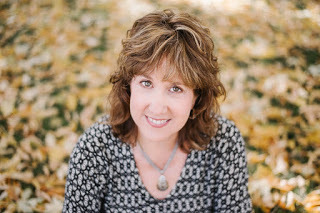 Beth K. Vogt believes God’s best often waits behind the doors marked “Never.”
Beth K. Vogt believes God’s best often waits behind the doors marked “Never.”
A nonfiction writer and editor who said she’d never write fiction, Beth is now a novelist with Howard Books. She enjoys writing inspirational contemporary romance because she believes there’s more to happily-ever-after than the fairy tales tell us. Connect with Beth on her website, Twitter, Facebook, or check out her blog on quotes, In Others’ Words.

I took karate a number of years ago — okay, a lot of years ago. It’s how I met my husband. He swept me off my feet in a karate studio. To be completely honest, he knocked me down.
Yeah, so romantic.
But here’s the point: In karate, you’re taught how to fall. You practice falling down and getting back up, falling down and getting back up — over and over again. And yes, there is a technique, a bit of skill, to falling well.
I’m wondering, setting aside what I learned in that karate studio, what kind of “When you fall, here’s how you get back up” insights would I share with someone else today?
Something like:
Falls are gonna happen — and they’re gonna hurt. It’s okay to say “ouch” and even cry a bit.Falls — even when you think you’re prepared for them — can cause an unexpected injury. Adjust to it, don’t deny it.Falls mean you need to get back up. Don’t be embarrassed to ask for help. But before you get up, see if there’s anything you learned from your on-the-ground-looking-up perspective.
In Your Words: How would you tell someone to fall? Any “When you fall, here’s how you get back up” insights?
TWEETABLELearning how to fall - insight from @BethVogt (Click to Tweet)
 Beth K. Vogt believes God’s best often waits behind the doors marked “Never.”
Beth K. Vogt believes God’s best often waits behind the doors marked “Never.” A nonfiction writer and editor who said she’d never write fiction, Beth is now a novelist with Howard Books. She enjoys writing inspirational contemporary romance because she believes there’s more to happily-ever-after than the fairy tales tell us. Connect with Beth on her website, Twitter, Facebook, or check out her blog on quotes, In Others’ Words.
Published on May 14, 2016 01:00



